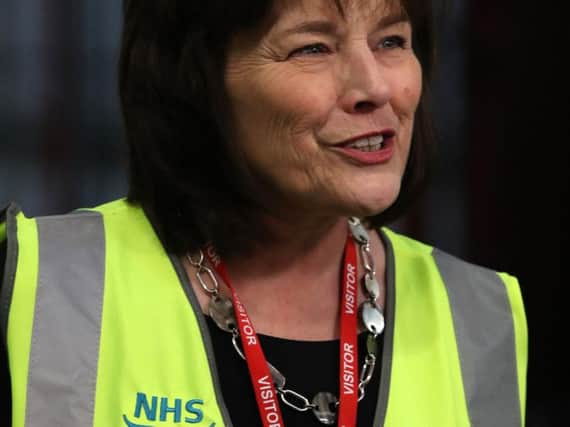Staff shortages leading to late diagnosis of Scottish cancer patients


The Scottish Parliament’s Cross Party Group on Cancer report concludes that the Scottish Government’s plans to tackle the killer disease have failed to take a long-term approach and is under-funded, thwarting efforts to boost patients’ survival rates.
In June 2019, more than 18 per cent of patients were waiting for longer than the Scottish Government target of six weeks for a key diagnostic test – more than double the proportion compared to just three years ago.
Advertisement
Hide AdAdvertisement
Hide AdEvery year around 32,200 people in Scotland are diagnosed with the disease. More than 16,000 people north of the border died from cancer last year.
By 2035, it has been estimated this will rise by around a quarter with more than 40,000 people expected to be diagnosed each year.
This is set to become more acute due to a growing and aging population.
Last month a report by ISD Scotland showed cancer continues to kill more people in Scotland than any other disease.
Today's report - Priorities for the Future of Cancer Care in Scotland - will be presented at the Scottish Cancer Conference in Glasgow by Anas Sarwar, Scottish Labour MSP, the Cross Party Group (CPG) co-convener.
The report’s findings will put more pressure on Health Minister Jeane Freeman who has been urged to resign after Mr Sarwar disclosed in the Scottish Parliament claims from a whistleblower that the death of a 10-year-old girl, who was in remission but who died in a ward at the flagship Queen Elizabeth University Hospital in Glasgow in 2017, was linked to contaminated water.
Major challenges facing cancer services
Yesterday it emerged that a police investigation is underway following the death of a three-year-old boy in the same month at the same hospital where the girl, later named as Milly Main, was being treated.
It was further revealed that a number of senior staff at the hospital have resigned from their posts in infection control, including the lead infection control doctor, due to their concerns over safety in ward 6A which houses children with cancer, pressure and concerns about management.
Advertisement
Hide AdAdvertisement
Hide AdMr Sarwar said: “This report must serve as an urgent wake-up call for the Scottish Government.
“Cancer survival is being put at risk because of a chronic staffing shortage in our NHS. This has devastating consequences for patients with cancer and their families and friends.
“With a growing and ageing population, the time for action is now. We need a long-term workforce plan backed up by sufficient investment and resources to save lives in Scotland.”
The CPG on Cancer involves 76 organisations and individuals from across cancer research, treatment, care and prevention, as well as a number of cancer patient representatives.
Miles Briggs, MSP, Scottish Conservative shadow health secretary, and co-convenor of the CPG, said: “The in-depth inquiry conducted by the Scottish Parliament’s Cross Party Group on
Cancer has highlighted in stark terms the major challenges facing cancer services and the failure of Scottish Government Minsters to provide for the increasing and changing workforce needs especially in the delivery diagnostic services.
“The key message from the inquiry is there simply isn’t enough NHS staff to do the job and, after more than 12 years in control of health, Scottish Ministers have not met this priority and outcome in the Cancer Strategy.
“Scottish Ministers have been warned repeatedly about the impact of this not just on cancer patients, but also on over-stretched NHS staff too.
Advertisement
Hide AdAdvertisement
Hide Ad“A damning report like this must spur Scottish Ministers into action. We now need to see urgent action to improve cancer services across Scotland.”
Michelle Mitchell, Cancer Research UK’s chief executive, who is also addressing the conference, said: “The findings of this inquiry are deeply concerning.
“Diagnosing cancer early can make all the difference, but there are major shortages in the staff trained to carry out the tests that diagnose cancer.
“Cancer services in Scotland are already struggling. Without urgent action, this will only worsen as demand increases.
“The Scottish Government must act now and publish a long-term cancer workforce plan – to enable the NHS to do its best by patients today and prepare for rising demand in the future.”
Government focus on improving survival rates
Ms Freeman, said: “Cancer is an absolute priority for the Scottish Government and our £100 million cancer strategy is focused on improving survival rates and ensuring we have the right workforce.
“We are driving a continued downward trend in cancer mortality rates with recent figures showing age-adjusted mortality rates for all cancers combined decreased by 10 per cent between 2009 and 2018. Through a range of actions more people are surviving cancer than ever before.
“Early detection of cancer is crucial to this continued improvement which is why last year the Scottish Government launched an £850 million Waiting Times Improvement Plan.
Advertisement
Hide AdAdvertisement
Hide Ad“Part of this funding will be used to reduce waiting times for patients whose treatment is urgent through an expansion of both the workforce and CT and MRI scanning to ensure those waiting for tests are seen as quickly as possible.
“And only last week the Scottish Government announced additional radiology and oncology training posts to be recruited in 2020.
“It is important to note that Scotland will be the first nation in the UK to offer a key support worker to help with the financial, emotional and wider impacts of living with cancer in recognition of the wider impact on patients and their families.”